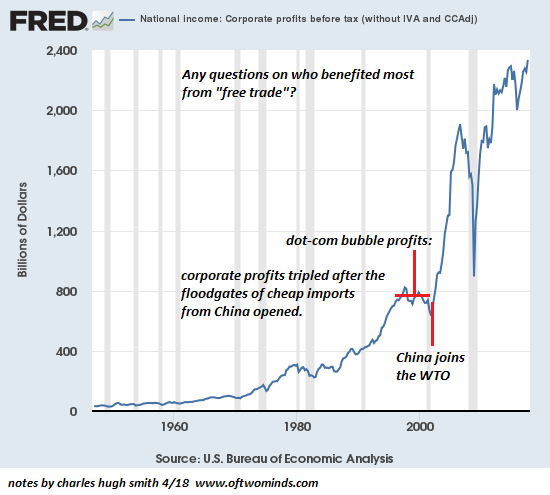Were Trade Wars Inevitable?
Trade in which mobile capital is the comparative advantage is a system of Neocolonial exploitation of developing-world nations.
Were trade wars inevitable? The answer is yes, due to the imbalances and distortions generated by financialization and central bank stimulus. Gordon Long and I peel the trade-war onion in a new video program, Were Trade Wars Inevitable? (27:48)
Let’s stipulate right off the bat that trade is not necessarily win-win–the winners (corporations, financiers and the financial sector) have skimmed the majority of the gains, leaving the losers with a few pennies of dubious value.
Consumers’ got a nickel in savings and a disastrous decline in quality, while corporations reaped 95 cents of additional profits:

As I explained in Forget “Free Trade”–It’s All About Capital Flows (March 9, 2018), the comparative advantage into today’s global economy is mobile capital: i.e. access to low-cost credit in nearly unlimited sums.
Those with low-cost credit created by central banks issuing reserve currencies in nearly unlimited sums can outbid everyone else for productive assets.
In effect, trade in which mobile capital is the comparative advantage is a system of Neocolonial exploitation of developing-world nations which don’t have reserve currencies they can create out of thin air. Trade is exploitation via cheap credit.
The winners are the few at the top of the wealth-power pyramids in both exporting and importing nations. I discussed this recently in There is No “Free Trade”–There Is Only the Darwinian Game of Trade (March 12, 2018).
Central bank policies don’t just distort domestic economies, they distort global trade, which parallels domestic distributions of winners (a few at the top) and losers (everyone else).
Trade is intertwined with currencies. China has used its currency peg to the USD to avoid being exploited; China has followed a “Goldilocks” strategy that keeps its currency, the yuan/RMB, in a narrow range: not too costly, not too cheap.
…click on the above link to read the rest of the article…